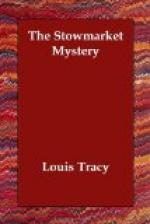He remembered the advice of an old cavalry officer: “Always give ’em the point between the eyes. They come head first, and you reach ’em at the earliest moment.”
Nevertheless, he experienced a quick quiver down his spine when the other man deliberately stopped and looked after him. He did not turn his head, but he could “feel” that vicious glance travelling over him, could hear the unspoken question: “Now, I wonder who you are, and what you want here?”
He staggered slightly, recovered his balance, and went on. It was a masterpiece of suggestiveness, not overdone, a mere wink of intoxication, as it were.
It sufficed. Such an explanation accounts for many things in London.
The watcher resumed his interrupted progress. Brett crossed the street and deliberately knocked at the door of a house in which the ground floor was illuminated.
Someone peeped through a blind, the door opened as far as a rattling chain would permit.
“Good evening,” said Brett.
“What do you want?” demanded a suspicious woman.
“Mr. Smith—Mr. Horatio Smith.”
“He doesn’t live here.”
“Dear me! Isn’t this 76 Middle Street?”
“Yes; all the same, there’s no Smiths here.”
The door slammed; but the barrister had attained his object. The other man had entered No. 37.
CHAPTER XXV
WHERE DID MARGARET GO?
In the Kennington Park Road he hailed hansom and drove home. Winter awaited him, for Smith now admitted the detective without demur should his master be absent.
The barrister walked to a sideboard, produced a decanter of brandy, and helped himself to a stiff dose.
“Ah,” he said pleasantly, “our American cousins call it a ’corpse reviver,’ but a corpse could not do that, could he, Winter?”
“I know a few corpses that would like to try. But what is up, sir? I have not often seen you in need of stimulants.”
“I am most unfeignedly glad to give you the opportunity. Winter, suppose, some time to-morrow, you were told that the body of Reginald Brett, Esq., barrister-at-law, and a well-known amateur investigator of crime, had been picked up shortly after midnight in the Kennington district, whilst the medical evidence showed that death was caused by a fractured skull, the result of a fall, there being no other marks of violence on the person, what would you have thought?”
“It all depends upon the additional facts that came to light.”
“I will tell them to you. You were aware that I had quitted the hotel, because you called there?”
“Yes.”
“Whom did you see?”
“Mr. David. He said that you were angry with Mrs. Capella, for no earthly reason that he could make out. He further informed me that she had followed you when you left the room, and had not returned, being presumably in her own apartment.”




